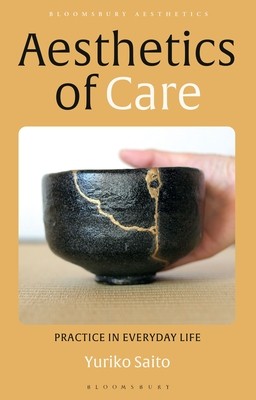
- We will send in 10–14 business days.
- Author: Yuriko Saito
- Publisher: Bloomsbury Publishing PLC
- Year: 2022
- Pages: 256
- ISBN-10: 1350134198
- ISBN-13: 9781350134195
- Format: 14 x 21.6 x 1.4 cm, kieti viršeliai
- Language: English
- SAVE -10% with code: EXTRA
Reviews
Description
Building upon her previous work on everyday aesthetics, Yuriko Saito argues in this book that the aesthetic and ethical concerns are intimately connected in our everyday life. Specifically, she shows how aesthetic experience embodies a care relationship with the world and how the ethical relationship with others, whether humans, non-human creatures, environments, or artifacts, is guided by aesthetic sensibility and manifested through aesthetic means.
Weaving together insights gained from philosophy, art, design, and medicine, as well as artistic and cultural practices of Japan, she illuminates the aesthetic dimensions of various forms of care in our management of everyday life. Emphasis is placed on the experience of interacting with others including objects, a departure from the prevailing mode of aesthetic inquiry that is oriented toward judgment-making from a spectator's point of view. Saito shows that when everyday activities, ranging from having a conversation and performing a care act to engaging in self-care and mending an object, are ethically grounded and aesthetically informed and guided, our experiences lead to a good life.
EXTRA 10 % discount with code: EXTRA
The promotion ends in 23d.00:28:10
The discount code is valid when purchasing from 10 €. Discounts do not stack.
- Author: Yuriko Saito
- Publisher: Bloomsbury Publishing PLC
- Year: 2022
- Pages: 256
- ISBN-10: 1350134198
- ISBN-13: 9781350134195
- Format: 14 x 21.6 x 1.4 cm, kieti viršeliai
- Language: English English
Building upon her previous work on everyday aesthetics, Yuriko Saito argues in this book that the aesthetic and ethical concerns are intimately connected in our everyday life. Specifically, she shows how aesthetic experience embodies a care relationship with the world and how the ethical relationship with others, whether humans, non-human creatures, environments, or artifacts, is guided by aesthetic sensibility and manifested through aesthetic means.
Weaving together insights gained from philosophy, art, design, and medicine, as well as artistic and cultural practices of Japan, she illuminates the aesthetic dimensions of various forms of care in our management of everyday life. Emphasis is placed on the experience of interacting with others including objects, a departure from the prevailing mode of aesthetic inquiry that is oriented toward judgment-making from a spectator's point of view. Saito shows that when everyday activities, ranging from having a conversation and performing a care act to engaging in self-care and mending an object, are ethically grounded and aesthetically informed and guided, our experiences lead to a good life.


Reviews